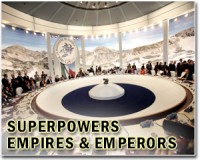| . |  |
. |
Washington (AFP) Jan 12, 2011 Presidents Barack Obama and Hu Jintao will try to patch up frayed economic ties when they meet in Washington next week, but a far-reaching power shift hangs uneasily over the meeting. When China's leader visits the White House Wednesday a spotlight will be shone on relations between the world's established -- and some say declining -- economic power, and an emerging rival. The agenda will feature a plethora of trade irritants, from Beijing's pursuit of domestic-first procurement policies to its continued suppression of the yuan, a policy Washington says floods the US with cheap imports costing local jobs. After some limited success in shifting China's stance in the last year, Treasury Secretary Timothy Geithner on Wednesday laid down Washington's offer to finally break the deadlock. In return for China steering its economy toward domestic growth and away from over-dependence on cheap exports, Geithner offered better access to high-tech US products, greater investment opportunities and preferential trade terms. Still, few expect a major breakthrough. And the longer tensions rumble on, the more they are seen as something more significant than the normal rough-and-tumble of world trade. For some observers the currency spat has become the most visible and most tangible evidence that China is, more rapidly than expected, eclipsing the United States. "The shift of economic gravity toward Asia and away from the transatlantic, is simply a fact," said Jeffrey Bergstrand, a finance professor at the University of Notre Dame. "We are at this very historic moment where China is developing, much in the manner that Japan did after World War II." According to Bergstrand, China's rapid rise has caused global imbalances that should spur the yuan's value to rise, despite Beijing's reluctance. If China does not move, he said, it runs the risk of damaging inflation as exporters vie with local producers for scarce resources and ordinary citizens see the cost of living soar. "When there are major economic structural shifts like this relative prices have to change, much as the Japanese yen appreciated," he said. China's reluctance to change, and US insistence that it must, says much about their preparedness for Beijing's rise, according to Martin Jacques, a China expert and author. "Clearly the financial crisis marked a big shift in power between the two countries, although there is denial on both sides." "There is absolutely no doubt that the United States is now weaker vis-a-vis China," said Jacques. "The Chinese are still adjusting to what it means... governing China is an extremely complicated process and keeping it together is an extremely complicated process." "I think that China will allow the currency to appreciate, but it will do it at its own speed and in its own way, for internal reasons." According to Jacques, shrill demands from Congress and elsewhere show the United States has also not come to terms with the new reality. "I think the Americans are finding it very difficult to come to terms with the idea that they are now in a weaker position." "There is a notion of decline, but it is very new and the implications of it have not been worked through." "It arrived a bit quicker than they had anticipated." Meanwhile business leaders stress the need for the US-China trade bicycle to keep moving, for fear it may topple if stopped. According to John Frisbie, the US-China Business Council, both countries need to press ahead with the day-to-day business of trade, while tackling larger issues. Deals on innovation and government procurement, protection of intellectual property rights, legitimate software usage or US exports of beef will help, so too meetings between the country's leaders -- breakthrough or no breakthrough. "It is a relationship in transition and the visit is an important part of navigating that transition," he said.
Share This Article With Planet Earth
Related Links Learn about the Superpowers of the 21st Century at SpaceWar.com Learn about nuclear weapons doctrine and defense at SpaceWar.com
 New Chinese arms aimed at US: military chief
New Chinese arms aimed at US: military chiefWashington (AFP) Jan 12, 2011 China's new weapons programs, including the J-20 stealth aircraft, appear to be directed against the United States, the highest-ranking US military officer said Wednesday. "China is investing in very high-end, high-tech capabilities and the question that is always out there is to try to understand exactly why," said Admiral Mike Mullen, head of the Joint Chiefs of Staff. "The opaqueness ... read more |
|
| The content herein, unless otherwise known to be public domain, are Copyright 1995-2010 - SpaceDaily. AFP and UPI Wire Stories are copyright Agence France-Presse and United Press International. ESA Portal Reports are copyright European Space Agency. All NASA sourced material is public domain. Additional copyrights may apply in whole or part to other bona fide parties. Advertising does not imply endorsement,agreement or approval of any opinions, statements or information provided by SpaceDaily on any Web page published or hosted by SpaceDaily. Privacy Statement |